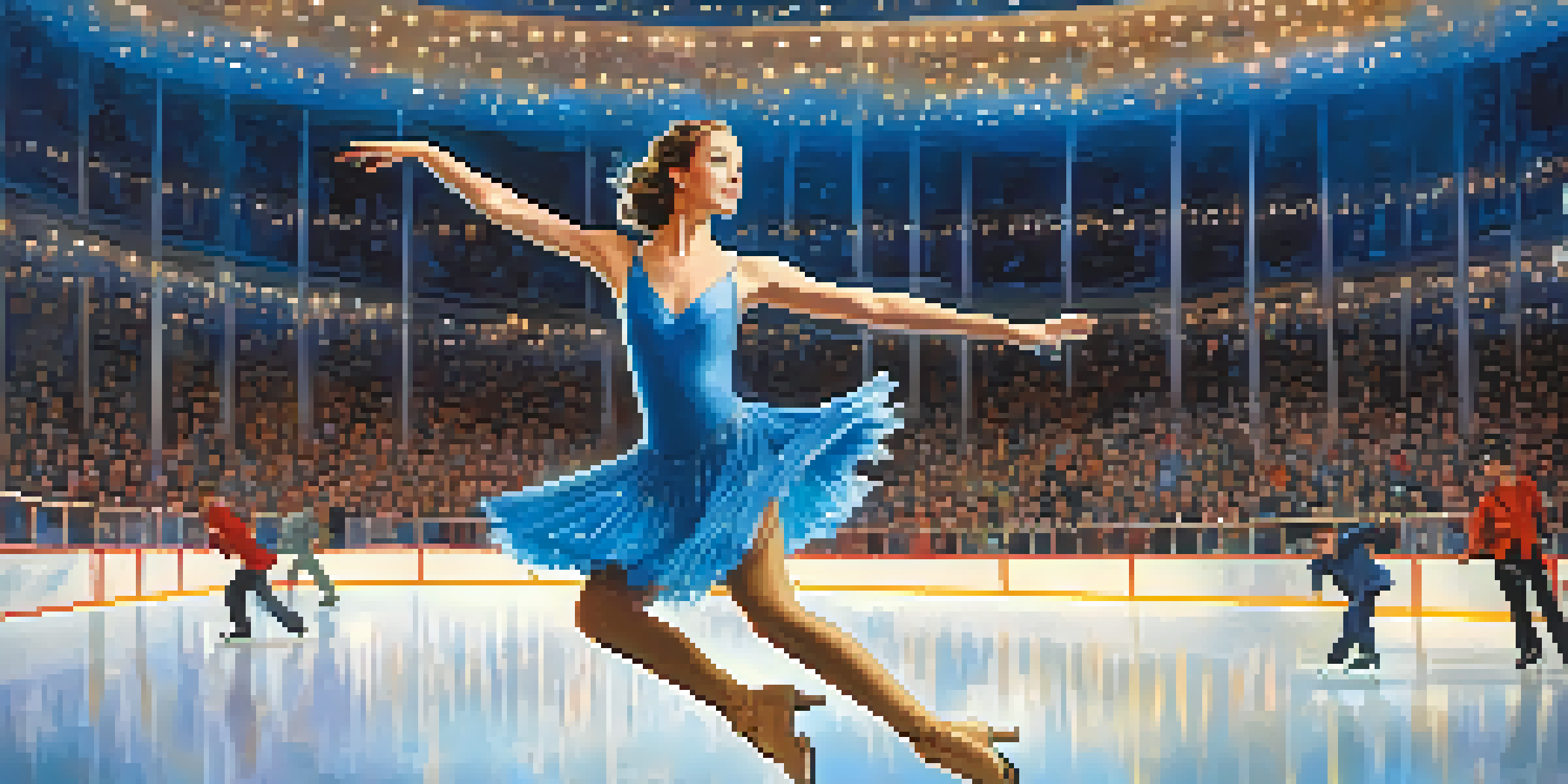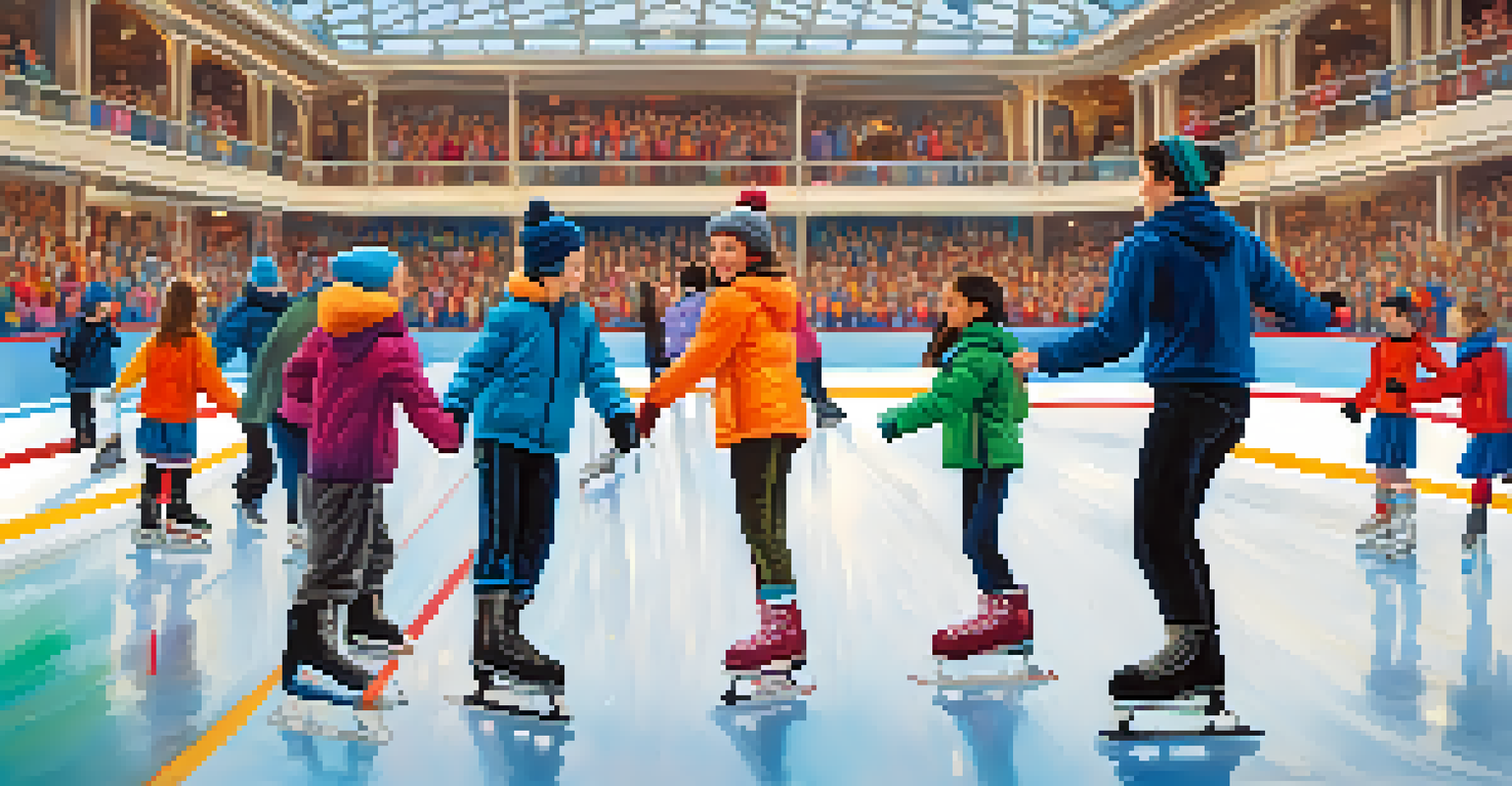The Impact of Music on Ice Skating Performances

The Role of Music in Ice Skating
Music serves as the heartbeat of ice skating, setting the tempo and mood for performances. It helps skaters express their artistry while executing complex moves. Without music, a performance can feel flat and lack emotional depth, making it less engaging for the audience.
Music is the shorthand of emotion.
When skaters choose a piece that resonates with them, it often leads to a more authentic performance. The right background score can transform a routine from a simple display of skill into a storytelling experience. This connection to the music enables skaters to immerse themselves fully, captivating viewers.
Additionally, music influences the choreography and technical elements of a routine. For example, rhythmic patterns help skaters time their jumps and spins, enhancing the overall flow of the performance. This synergy between music and movement is crucial for a successful routine.
Emotional Connection Through Music
Music has a unique ability to evoke emotions, and this is especially true in ice skating. A skater’s choice of music can reflect their personality and story, making their performance relatable. This emotional connection can draw the audience in, creating a shared experience.

For instance, a dramatic piece might elicit feelings of tension and anticipation, while a lively tune can convey joy and excitement. This emotional range allows skaters to explore different facets of their artistry. When skaters effectively convey these emotions, it adds layers to their performance.
Music Enhances Ice Skating Performances
Music serves as the emotional backbone of ice skating, transforming performances into captivating storytelling experiences.
Furthermore, judges often consider the emotional impact of a performance when scoring. A routine that resonates with the audience can leave a lasting impression, influencing their overall assessment. This connection underscores the importance of selecting the right piece of music.
Choosing the Right Music for Performance
Selecting the right music is a pivotal part of an ice skater's preparation. Skaters often spend time analyzing various genres to find a piece that complements their style and strengths. This choice can be the difference between a memorable performance and one that fades from memory.
The only truth is music.
For many skaters, the music must not only fit their personality but also suit the theme of their routine. The right track can enhance the choreography, making jumps and spins appear more fluid and natural. This thoughtful selection process is crucial for creating a cohesive performance.
Additionally, skaters must consider factors like tempo and rhythm when choosing music. A fast-paced piece can energize a performance, while a slower melody can highlight grace and technical precision. This balance is essential for achieving a well-rounded routine.
The Psychological Effect of Music on Skaters
Music can significantly impact a skater's mindset and performance. Listening to motivational tracks before stepping onto the ice can boost confidence and reduce anxiety. This mental preparation is vital for delivering a successful routine.
Moreover, familiar music can evoke positive memories or feelings, helping skaters channel those emotions into their performance. This psychological boost can lead to improved concentration and focus during critical moments on the ice. It’s like having a secret weapon that enhances their abilities.
Emotional Connection Engages Audiences
The right music not only reflects a skater's personality but also draws audiences in, creating a shared emotional experience.
Research has shown that the right music can lead to better performance outcomes by creating a positive mental state. Skaters who feel good about their music choices often perform at their best. This highlights the profound influence of music on both the mind and body.
The Use of Music in Training
Music isn't just for performances; it plays a vital role in training as well. Many skaters incorporate music into their practice sessions to improve timing and rhythm. This practice allows them to feel the beat and synchronize their movements more effectively.
Training with music can also help skaters maintain motivation and focus during long practice sessions. It makes the training environment more enjoyable, turning tedious drills into dynamic routines. This enjoyment can lead to better overall performance and skill development.
Additionally, coaches often use music to help skaters develop their unique style. By experimenting with various tracks, skaters can discover how different rhythms affect their movements. This exploration fosters creativity and innovation in their routines.
Music and Audience Engagement
The right music can significantly enhance audience engagement during an ice skating performance. When the audience connects emotionally with the music, they are more likely to become invested in the skater's story. This emotional engagement can elevate the entire experience for everyone involved.
A well-chosen piece can elicit cheers, gasps, or even tears from the audience, creating a memorable atmosphere. This interaction is essential for skaters, as it fuels their passion and energy on the ice. The audience's response can act as a powerful motivator.
Music Influences Skater Performance
Choosing the right music can boost a skater's confidence and focus, significantly impacting their overall performance on the ice.
Moreover, memorable performances often lead to increased interest in the sport. When audiences are moved by a routine, they are more likely to share their experience with others. This word-of-mouth promotion is invaluable for the growth of ice skating as a popular sport.
The Future of Music in Ice Skating
As ice skating evolves, so too does the role of music within the sport. New genres and technological advancements are influencing how skaters choose and use music. From electronic beats to classical arrangements, the possibilities are endless.
Innovations in sound technology allow for greater creativity in performances, enabling skaters to incorporate unique soundscapes. This evolution encourages skaters to step outside traditional boundaries, offering fresh perspectives on routines. Such changes can lead to exciting developments in the sport.

Looking ahead, the fusion of music and technology may redefine how audiences experience ice skating. With immersive sound experiences and interactive performances on the horizon, the future promises to be vibrant and engaging. This ongoing evolution will continue to highlight the profound relationship between music and ice skating.